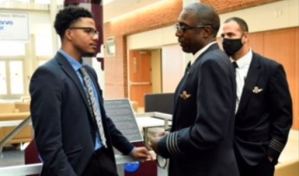By Janell Gore, South Kern Sol
The Kern County Superintendent of Schools held a press conference to discuss the $18 million Workforce grant they received. They in collaboration with Kern Community College District (KCCD), California State University of Bakersfield (CSUB), and other education boards plan to use this grant to elevate students in Kern County and provide opportunities for more sustainable careers.
“Kern County will not be able to achieve inclusive economic growth and decrease the number of struggling families in our region without improving educational attainment,” said CSUB president Dr. Lynnette Zelezny.
Zelezny stated that 17% of Kern County residents hold a bachelor’s degree and that California is at 34%. The educational gap mentioned also leads to a workforce gap that she said this grant will help close.
Many jobs require a certain educational background and employers are forced to leave Kern County to find employees that will match the needed criteria. Zelezny said this will help to build the employees needed. Rick Jhaj the Chief Development Officer of Countryside Corporation stated that helping residents get into financially sustainable positions now will also help their families down the line.
“We can help increase chances of financial freedom for local families as to help greater stability in their lives,” said Jhaj “Which will trickle down to their descendants and provide opportunity to break that cycle for many families whose children have to drop out of school to help their families survive their day to day.”
In order to attain these goals they are focusing heavily on three specific workforce pathways, healthcare, education, and engineering. According to Dr. Jessica Grimes the Chair of the Central Mother Lode Consortium and Dean of Economic and Workforce Development at KCCD, these three career pathways in Kern County do not typically receive a lot of students and the jobs provide sustainability and mobility.
“We don’t just want students to be at the living wage. We want them to be able to advance because we’re fighting generational poverty,” said Grimes.
The funding will also be used to put more efforts in dual enrollment and increase the number of high school students graduating with college credits.
For additional support for students they are emphasizing high-tech high-touch which is to help students who may not be able to meet with counselors in person. Students can use the program pathway mapper online to see what is needed for them to meet their goals.
Superintendent Mary C. Barlow also mentioned that students can go online to California Colleges website and put in their information to see what additional services they can qualify for to help with school.











